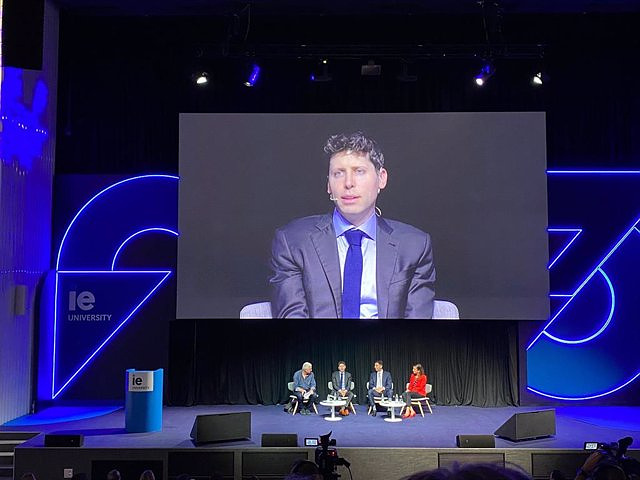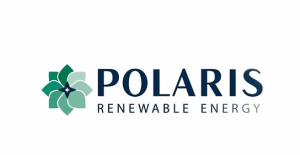MADRID, 22 May. (Portaltic/EP) -
The CEO of OpenAI, Sam Altman, believes that regulation for small language models powered by Artificial Intelligence (AI) "does not make sense" and is committed to regulating large models such as, in this case, OpenAI's ChatGPT, because they are "the ones who can really do harm".
This was expressed by the executive director of the company that creates tools such as Whisper and Dall-E2, in a colloquium held this Monday at IE University, where he was accompanied by OpenAI research scientist Mo Bavarian; Owners Scaleup Program Executive Director Joe Haslam; and the co-founder and CEO of Clibrain, Elena González-Blanco.
During the presentation, the CEO of OpenAI has remarked that regulation is "very important", but has also emphasized that over-regulating "is not good" since, in the case of small language model companies, it would cut their capacity of innovation and creation.
"We don't think regulation for small models makes sense," Altman observed, while noting that regulation has to be designed for large models, and provide that we really "can't do any harm in the world." Thus, he has suggested that small models should be "allowed to grow" and that the logical thing to do is to focus regulatory attention on large models, since "we are the ones who can manage them."
Likewise, the CEO of OpenAI has stressed the importance of privacy and the concern that exists around this issue at all levels. In this sense, he has assured that the company will continue "working with other governments around the world" to improve the language models driven by AI and protect privacy.
In addition, he has pointed out that from OpenAI they want to carry out technology with which "people are comfortable and safe". "We want to do what people want. We want to create the product that people want to use," said Altman, referring to the work they have been carrying out with ChatGPT to improve aspects such as privacy, data security and security. Quality of the information.
"It is fair and reasonable to be skeptical," he said, while admitting that technology's work with AI "has not been perfect." In this sense, he has pointed out that although there have been "many errors", all the work carried out to solve them and create improvements must also be taken into account.
In the same way, Altman has explained that they have pushed these technologies, in this case ChatGPT, to be "open to the world", even knowing that they are not perfect because "people have to try them". In other words, as he has developed, he considers it better that people, institutions and governments test a technology of these characteristics even if it is not yet completely ready, to see "how it can be used in a good and bad way and, based on this, adapt it to society.
For all these reasons, he has reiterated the importance of regulating AI-powered language models such as ChatGPT, but he has also emphasized that what concerns the company is, above all, "doing the right thing" and, therefore, has put into value that they have been "making ChatGPT more secure" for eight months.
Asked by the European Union (EU) in the fields of technology and AI, Sam Altman has indicated that the talent and quality of technology development in Europe is "brilliant" and has been very important for this field. In fact, he has stressed that OpenAI "would not have happened without Europeans" and that a large part of his staff is from different EU countries.
Following this line, he has added that it is a space where "all the ingredients are ready to be a place of innovation" and that you only need to have "the commitment to do it". However, Altman has pointed out that, from his point of view, he would make "some legal changes", and that Europe should not "hold back", but rather "lead" with its technology.
As you explained, the success of ChatGPT and the OpenAI language models is based on three characteristics. First of all, it is an algorithm "that can really learn", that is, it can make relationships between a large amount of data and that "was not obvious to people".
Also, the algorithm is predictable; "We can predict how good the results are going to be," Altman explained. Finally, he has detailed that with "very little data", it is an algorithm capable of behaving like "any system of values". For all this, he has indicated that "he has all the ingredients" to go far.
Specifically, Altman and Bavarian have explained that they use ChatGPT personally "very often" and that, above all, within OpenAI they use it to code and connect all the technology within the company. In this sense, they have remarked that, above all, the intention of ChatGPT is to become a super AI assistant that can "help with everything". Thus, they have indicated that the idea is that it can help to carry out small tasks and that they are increasingly complex tasks.
On the other hand, the executive director has also pointed out that another of the objectives of technologies such as ChatGPT is to balance society. With this, he has made reference to the possibility of helping anyone to have access to information or tools to be able to develop their initiatives, "regardless of who they are".
Thus, the CEO of OpenAI has also referred to education and how tools such as ChatGPT interfere. In this regard, he has pointed out that it can mean a "super tool" for both teachers and students and that, therefore, everyone should "embrace" this change in the model of education that is to come. "Educational institutions need to be in on this," Altman has said.
In addition to all this, he concluded by recalling that AI-driven technology, such as OpenAI, is the "most empowering technology that human beings have seen" and that, thanks to it and the creativity and innovation capabilities it presents, " The world is going to be tremendously different and better." "If you give people better tools, you will have a better future", has sentenced the CEO of OpenAI.

 Exploring Cardano: Inner Workings and Advantages of this Cryptocurrency
Exploring Cardano: Inner Workings and Advantages of this Cryptocurrency Seville.- Economy.- Innova.- STSA inaugurates its new painting and sealing hangar in San Pablo, for 18 million
Seville.- Economy.- Innova.- STSA inaugurates its new painting and sealing hangar in San Pablo, for 18 million Innova.- More than 300 volunteers join the Andalucía Compromiso Digital network in one month to facilitate access to ICT
Innova.- More than 300 volunteers join the Andalucía Compromiso Digital network in one month to facilitate access to ICT Innova.-AMP.- Ayesa acquires 51% of Sadiel, which will create new technological engineering products and expand markets
Innova.-AMP.- Ayesa acquires 51% of Sadiel, which will create new technological engineering products and expand markets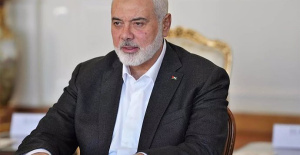 Hamas views Israel's latest deal proposal in "positive spirit"
Hamas views Israel's latest deal proposal in "positive spirit"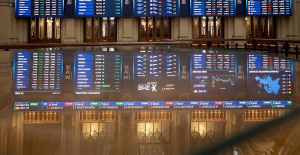 The Ibex 35 rises 0.22% mid-session driven by Aena (4.66) and Sabadell (4.57%)
The Ibex 35 rises 0.22% mid-session driven by Aena (4.66) and Sabadell (4.57%)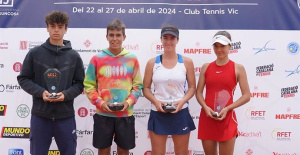 STATEMENT: Selena Romero and Roberto Pérez winners of the 22nd Nacho Juncosa Memorial - International under-16 tennis tournament
STATEMENT: Selena Romero and Roberto Pérez winners of the 22nd Nacho Juncosa Memorial - International under-16 tennis tournament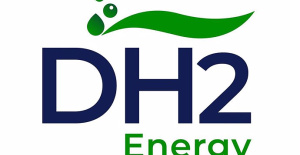 STATEMENT: DH2 Energy is the winner in the first European renewable hydrogen auction
STATEMENT: DH2 Energy is the winner in the first European renewable hydrogen auction How Blockchain in being used to shape the future
How Blockchain in being used to shape the future Not just BTC and ETH: Here Are Some More Interesting Coins Worth Focusing on
Not just BTC and ETH: Here Are Some More Interesting Coins Worth Focusing on UPV students design an app that helps improve the ventilation of homes in the face of high temperatures
UPV students design an app that helps improve the ventilation of homes in the face of high temperatures Ivace and promotes a less invasive device for the early detection of prostate cancer
Ivace and promotes a less invasive device for the early detection of prostate cancer Valencia unanimously approves the ordinance to allocate spaces to test innovative initiatives
Valencia unanimously approves the ordinance to allocate spaces to test innovative initiatives UPV researchers promote a paid master's degree as a "talent factory" in integrated photonics
UPV researchers promote a paid master's degree as a "talent factory" in integrated photonics A million people demonstrate in France against Macron's pension reform
A million people demonstrate in France against Macron's pension reform Russia launches several missiles against "critical infrastructure" in the city of Zaporizhia
Russia launches several missiles against "critical infrastructure" in the city of Zaporizhia A "procession" remembers the dead of the Calabria shipwreck as bodies continue to wash up on the shore
A "procession" remembers the dead of the Calabria shipwreck as bodies continue to wash up on the shore Prison sentences handed down for three prominent Hong Kong pro-democracy activists
Prison sentences handed down for three prominent Hong Kong pro-democracy activists ETH continues to leave trading platforms, Ethereum balance on exchanges lowest in 3 years
ETH continues to leave trading platforms, Ethereum balance on exchanges lowest in 3 years Investors invest $450 million in Consensys, Ethereum incubator now valued at $7 billion
Investors invest $450 million in Consensys, Ethereum incubator now valued at $7 billion Alchemy Integrates Ethereum L2 Product Starknet to Enhance Web3 Scalability at a Price 100x Lower Than L1 Fees
Alchemy Integrates Ethereum L2 Product Starknet to Enhance Web3 Scalability at a Price 100x Lower Than L1 Fees Mining Report: Bitcoin's Electricity Consumption Declines by 25% in Q1 2022
Mining Report: Bitcoin's Electricity Consumption Declines by 25% in Q1 2022 Oil-to-Bitcoin Mining Firm Crusoe Energy Systems Raised $505 Million
Oil-to-Bitcoin Mining Firm Crusoe Energy Systems Raised $505 Million Microbt reveals the latest Bitcoin mining rigs -- Machines produce up to 126 TH/s with custom 5nm chip design
Microbt reveals the latest Bitcoin mining rigs -- Machines produce up to 126 TH/s with custom 5nm chip design Bitcoin's Mining Difficulty Hits a Lifetime High, With More Than 90% of BTC Supply Issued
Bitcoin's Mining Difficulty Hits a Lifetime High, With More Than 90% of BTC Supply Issued The Biggest Movers are Near, EOS, and RUNE during Friday's Selloff
The Biggest Movers are Near, EOS, and RUNE during Friday's Selloff Global Markets Spooked by a Hawkish Fed and Covid, Stocks and Crypto Gain After Musk Buys Twitter
Global Markets Spooked by a Hawkish Fed and Covid, Stocks and Crypto Gain After Musk Buys Twitter Bitso to offset carbon emissions from the Trading Platform's ERC20, ETH, and BTC Transactions
Bitso to offset carbon emissions from the Trading Platform's ERC20, ETH, and BTC Transactions Draftkings Announces 2022 College Hoops NFT Selection for March Madness
Draftkings Announces 2022 College Hoops NFT Selection for March Madness